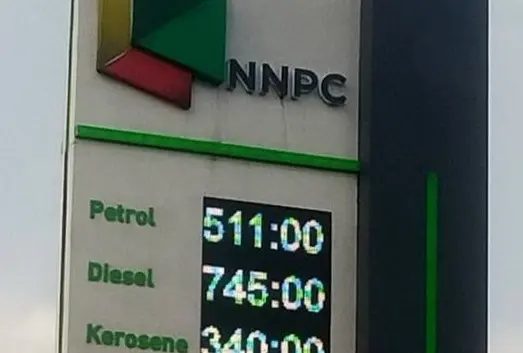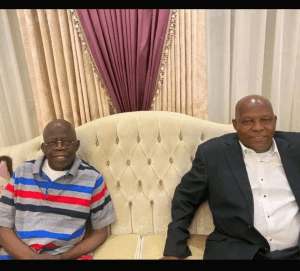Nigeria’s petroleum industry regulators and operators have formally effected a subsidy withdrawal, sending retail prices up by about 170 per cent to N500 per litre from the official rate of N185 per litre.
The new price template took effect yesterday, as the Federal Government’s meeting with the Nigeria Labour Congress, NLC, and Trade Union Congress, TUC, on the issue ended in deadlock in Abuja.
President Bola Tinubu declared subsidy “gone” in his inaugural speech on Monday.
The document communicating details of the new pricing regime also indicated that with N557 per litre, Borno and Yobe states have the highest price of petrol in Nigeria, while Lagos has the least price of N488 per litre.
It also showed petrol will sell at N537 per litre in Abuja, Nasarawa, Plateau, Kogi, Benue and Niger states, while the product will sell at N515 in Kwara State.
Under the new price regime, the product will sell at N550 per litre in Adamawa, Taraba, Bauchi and Gombe states ,while it will cost N540 per litre in Kano, Kaduna, Katsina, Sokoto and Jigawa.
The document further showed that the product will cost N545, N540 and N515 per litre in Kebbi, Zamfara and Abia respectively.
Depots sell at N470 per litre

Checks at the depots showed that depot owners that had shut down operations due to uncertainty, reopened yesterday, selling the product at N470 per litre.
It indicated that about N300 per litre will go as charges and margins to stakeholders in the value chain, including transporters and oil marketers.
We have adjusted our pumps nationwide — NNPC
Already, NNPC Limited in a statement by the Chief Corporate Communications Officer, Garba Deen Muhammad, said pump prices at its retail stations had been adjusted.
The statement read: “NNPC Limited wishes to inform our esteemed customers that we have adjusted our pump price of PMS across our retail outlets, in line with the current market realities.
“As we strive to provide you with the quality service we are known for, it is pertinent to note that prices will continue to fluctuate to reflect market dynamics.
“We assure you that NNPC Ltd is committed to ensuring the ceaseless supply of products. The Company sincerely regrets any inconvenience this development might have caused. We greatly appreciate your continued patronage, support and understanding through this time of change and growth”.
Checks by Vanguard around Abuja City centre and surrounding areas showed that while NNPC retail stations raised their prices to N537 per litre from N195, major and independent marketers dispensed at N540 per litre.
The Public Relations Officer of Independent Marketers Association of Nigeria, IPMAN, Chief Chinedu Ukadike, noted that though the marketers were waiting to be informed of the new ex-depot price, the group was ready for a competitive market.
“We have not been officially communicated on the new ex-depot price but we have seen the pricing list being shared on social media for NNPC stations.
“We are ready for deregulation. As of today, NNPC remains the sole importer of petrol into the country. This will have to change.
“The government has to create a level playing field for all operators in the downstream sector. Until Dangote Refinery comes on stream and other NNPC refineries begin to operate, importation will continue and this cannot be done by only one entity. Competitions mean multiple players and we are ready,” he said.
We support full deregulation — NEITI
Meanwhile, the Nigeria Extractive Industry Transparency Initiative, NEITI, insisted yesterday that deregulation of the downstream sector will block revenue leakages, improve revenue and enhance ongoing reforms in the oil and gas sector.
NEITI in a statement, noted that its “persistent calls for the removal of petrol subsidy were informed by the fact that the ways and means of funding the expenditure over these years relied more on federation accounts funds, the Federal Government and sometimes from external borrowing, with negative consequences on government’s overall revenue profiles.
“NEITI was also concerned that the consequences of funding subsidies have resulted in poor development of the downstream sector, declining GDP growth, rise in product theft, pipeline vandalism, environmental pollution and undue pressure on foreign exchange.
“Other challenges imposed on the economy were naira depreciation, low employment generation, declining balance of payments and worsening national debt.”
NLC rejects new prices
However, in a statement issued yesterday, the Nigeria Labour Congress, NLC, rejected the subsidy withdrawal, describing the new NNPCL pricing template as vexatious and an ambush.
In the statement, titled ‘’The dialogue is in danger”, the President of NLC, Joe Ajaero, said: “We are worried that the government through the NNPC, despite the ongoing meeting of stakeholders in the oil and gas sector to manage the unilateral but unfortunate announcement by the President to withdraw subsidy on petroleum products, went ahead this morning (yesterday) to announce a new regime of prices under a new pricing template.
“This is an ambush and runs against the spirit and principles of social dialogue which remains the best platform available for the resolution of all the issues arising from the petroleum downstream sector.
“Government cannot in one breath be talking about deregulation and at the same time fixing the prices of petroleum products.
‘’This negates the spirit of allowing the operation of the free market unless the government has as usual, usurped, captured or become market forces.
“It is, therefore, unacceptable and we seriously condemn it. Good faith negotiation is key to reaching an agreement. What the government has done is like holding a gun to the head of the Nigerian people and bringing undue pressure on the leaders, thus undermining the dialogue.
“We call on the Federal Government to immediately instruct the NNPC to withdraw this vexatious pricing template to allow free flow of discussions by the parties.
“Nigerians would not accept any manipulations of any kind from any of the parties, especially from the representatives of the government.
“Our commitment to this process is buoyed by the fact that all the parties would be committed to ensuring that it is carried out within the ambits of liberty without undue pressure.
“The release of that template may not allow us to continue if nothing is done to withdraw it so that the dialogue can continue unhindered. It is clear that the government is actually trying to scuttle the process.
“As it stands, the Federal Government has become fixated on their chosen course of action. Would this help this dialogue? It clearly will not. There must be flexibility to allow concessions and reasonable accommodation that will produce the best result for Nigerian people. This is what we all seek at this time.”
Labour’s meeting with FG ends in deadlock
Meanwhile, the meeting between the Federal Government and Organised Labour on the issue ended yesterday without any resolution.
The meeting called at the instance of the Federal Government at the Presidential Villa, Abuja, was to find a solution to the brewing crisis due to the effect of the subsidy removal and the hike in petroleum pump price.
Speaking to journalists after the meeting, President of Nigeria Labour Congress, Joe Ajaero, said as far as labour was concerned, there was no consensus
He said the principle of negotiation was for the government and the NNPCL to revert to status quo.
On the demands of organised labour, Ajaero said: “We should go back to status quo, negotiate, think of the alternatives and all the effects and how to address the effects this action will have on the people if it is an action that must take off.”
On the claim by the Federal Government that there was no money to continue with the subsidy, Ajaero, who was flanked by the President of the Trade Union Congress, TUC, Festus Osifo, said: “What is the purpose of governance? Is it the duty of NLC to raise funds for the government, collect tax, to sell crude at the international market when the price of crude is going high and the government that is a major importer of crude product is telling you there is no money? Other countries that are in the same scenario are eating fat.”
Asked whether it was realistic to continue with the payment of subsidy, the NLC President queried: “Why do you keep hampering on subsidy? What do you understand about subsidies? Has anybody explained to you the meaning of subsidy? What did they say is subsidy?
“Even in the USA, there is a subsidy on wheat products. Is there any country that does not subsidise the living of people, even if it is by providing public transportation? Those are the issues we are looking at.
“If you are a major producer of crude and you refine or carry the crude abroad and refine and bring it, definitely there will be difference in the price and that is what they are paying.
“If your father established a refinery and that refinery is in your hand and you are now refining abroad, you ask yourself some questions. We have refineries in Kaduna, Sapele, Warri and Port Harcourt, why are they not functioning that we have to go and refine abroad?’’
He wondered why the government should claim that it had deregulated the product and at the same time fix prices of the product.
Ajaero said in 2011, labour met with the government and agreed on some principles, including the repair of the refineries, to start operation latest by December last year but noted that nothing was done.
Talks still ongoing – FG DELEGATION
Representative of the Federal Government, Dele Alake, said: “We have been deliberating on finding very amicable solutions to the issue at hand, to the queues and all of that and the increase in pump price.
“We had a very robust engagement. We cross-fertilized ideas, ideas flew from all sides and there is one thing that is remarkable, even from the Labour side. We are all looking at the peace, progress and stability of Nigeria. That is what is paramount.
“Of course the NNPCL CEO is here, Mr Kyari, we cannot go into details now because the talks are still ongoing. We cannot finish everything at one sitting, so we have adjourned now, we are continuing the talks at a later date very shortly.
“But the point is that the talks are ongoing and it is always better for all sides to keep talking, with a view to arriving at a very amicable resolution that will be in the longer term interest for all Nigerians. That is as much as we can say now.”
Rehabilitate domestic refineries — NECA
Reacting to the development, the Nigeria Employers’ Consultative Association, NECA, called for immediate rehabilitation of the four public refineries, following the removal of subsidy on petrol.
In a statement yesterday, NECA’s Director-General, Wale-Smatt Oyerinde, said it is worrisome to note that prices of other commodities had skyrocketed a few hours after the President’s pronouncement of subsidy removal
He said: “The inaugural address of the President on fuel subsidy has generated heated reaction, with fuel queues returning to the petrol stations and the prices of goods and services increasing astronomically.
“The increase, if not well managed could lead to an increase in the prices of goods and services with consequential effects on the purchasing power of the already impoverished Nigerian.
“Already, inflation rate in the country is high at 22.22 per cent as recorded in April 2023 and as such, any increase in pump price of fuel will further accelerate inflation, which will distort and destabilize economic activities, shrink private sector business capitals and lower the real disposal income of the people.
‘’No doubt therefore, the economy would contract in terms of growth; business activities will face serious backlash; and aggregate consumption will fall due to inflationary pressure.
“While it is desirable to remove the fuel subsidy, which in real terms, is subsidizing inefficiency and corruption, it is important that the removal is systematically and strategically done in order not to further impoverish and worsen the already bad socio-economic indicators such as employment, poverty, per capita income and many more.
‘’It is worrisome to note that prices of other commodities have skyrocketed few hours after the President’s pronouncement of subsidy removal. Consequently, it is critically important that the new government approaches the removal of subsidy with caution to circumvent further degeneration in the economy.
“We reiterate that in the spirit of frontally addressing corruption as stated in the President’s inaugural address, efforts should be stepped up to complete rehabilitation of the refineries to complement the Dangote Refinery that just came on board.
‘’With this measure, it will be possible to attain scale in PMS refining in the country so as to moderate domestic prices.”
APC govs back Tinubu on subsidy removal, say, Atiku, Obi also promised same
Also yesterday, governors of the ruling All Progressives Congress, APC, have threw their weights behind the subsidy removal.
Chairman of the APC Governors’ Forum and Imo State governor, Senator Hope Uzodinma, made the declaration after meeting with the Senator Abdullahi Adamu-led National Working Committee, NWC, of the party.
According to Uzodinma, the main opposition presidential candidates, Atiku Abubakar of the Peoples Democratic Party, PDP, and Peter Obi of Labour Party, LP, also made promises to remove subsidy because it had generally become unsustainable.
He said; “As a Forum, we are committed to the ideals of the government that is also our party. Because the federal government belongs to APC. It is APC led government and everything that is contained in the manifesto of our great party during our campaigns are meant to be done and carried out.
“On the issue of fuel subsidy, all the presidential candidates during the campaigns, promised that they will remove fuel subsidy.
“The Buhari government before they left, made us to know that fuel subsidy was no longer sustainable.”
Source: Vanguard






















